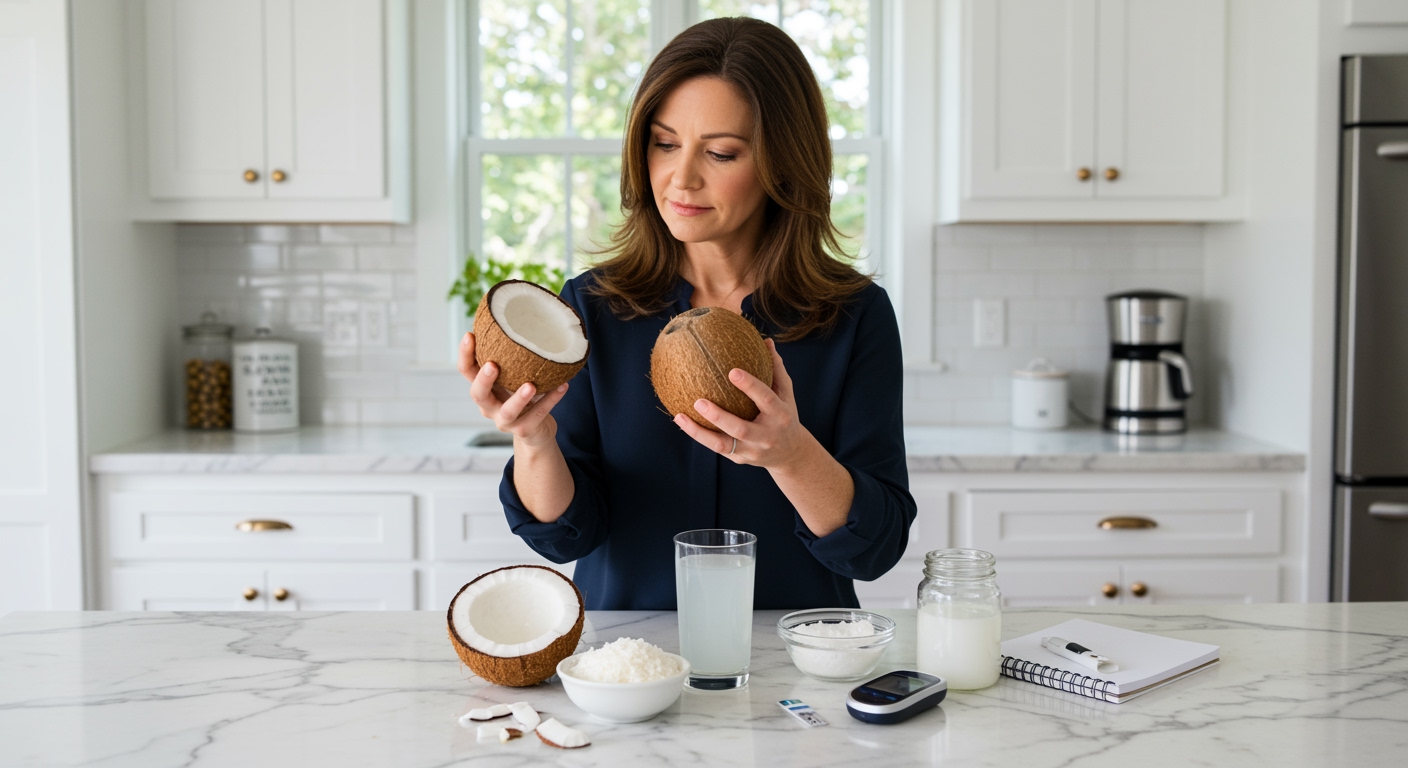✪ Key Takeaway: Fresh coconut meat is safe for diabetes with a low glycemic index, but coconut water requires portion control.
Introduction
You stare at that coconut in the grocery store wondering if it will send your blood sugar through the roof.
Many people with diabetes avoid coconut completely because they think all tropical fruits are sugar bombs waiting to wreck their glucose levels.
Hi, I am Abdur, your nutrition coach and today I am going to explain exactly how coconut affects your blood sugar and whether you can safely include it in your diabetes meal plan.
What Makes Coconut Different From Other Fruits?
Coconut stands apart from typical fruits because of its unique macronutrient profile.
Fresh coconut meat contains about 15 grams of carbohydrates per 100 grams, which is significantly lower than most fruits.
The magic lies in coconut’s high fiber content of 9 grams per 100 grams.
This fiber acts like a brake pedal for your digestive system, slowing down how quickly your body absorbs the natural sugars.
Coconut also packs healthy fats that further slow digestion and help stabilize blood sugar responses.
The combination of moderate carbs, high fiber, and beneficial fats creates a food that behaves very differently in your body compared to high-sugar fruits like mangoes or grapes.
✪ Fact: Coconut meat has a glycemic index of only 35, making it a low-glycemic food choice.
How Does Coconut Affect Your Blood Sugar?
The glycemic index tells us how quickly foods raise blood sugar levels.
Fresh coconut meat scores a low 35 on the glycemic index scale, putting it in the same category as diabetes-friendly foods like oatmeal and yogurt.
When you eat coconut, the fiber forms a gel-like substance in your stomach that slows glucose absorption.
This means your blood sugar rises gradually instead of spiking suddenly like it would with white bread or candy.
The medium-chain fatty acids in coconut also help your cells become more sensitive to insulin, which is crucial for blood sugar control.
Research shows that people with diabetes who include moderate amounts of coconut in their diet often experience more stable glucose levels throughout the day.
✪ Pro Tip: Eat coconut with protein or healthy fats to further slow sugar absorption and maximize blood sugar stability.
What About Coconut Water And Coconut Oil?
Coconut water tells a completely different story than coconut meat.
One cup of coconut water contains about 9 grams of sugar with minimal fiber to slow absorption.
This makes coconut water act more like a natural sports drink that can cause blood sugar spikes if consumed in large amounts.
However, coconut water does provide beneficial electrolytes like potassium and magnesium that support overall health.
Coconut oil presents yet another scenario entirely.
Pure coconut oil contains zero carbohydrates and will not directly affect your blood sugar levels.
The medium-chain triglycerides in coconut oil may actually help improve insulin sensitivity when used as part of a balanced diet.
✪ Note: Limit coconut water to 4-6 ounces per day and always check your blood sugar response when trying it first.
How Much Coconut Can You Safely Eat?
Portion control remains the key to including coconut safely in your diabetes meal plan.
A reasonable serving of fresh coconut meat is about 1/4 cup or 20 grams, which provides roughly 3 grams of carbohydrates.
This small serving fits easily into most diabetes meal plans without causing significant blood sugar fluctuations.
For coconut flakes or shredded coconut, stick to 1-2 tablespoons per serving to keep carbohydrate intake manageable.
Always pair coconut with protein or healthy fats to maximize its blood sugar stabilizing effects.
Monitor your individual response by checking blood glucose levels 1-2 hours after eating coconut to understand how your body specifically reacts.
Remember that everyone with diabetes responds differently to foods, so what works for others may not work exactly the same for you.
✪ Pro Tip: Start with smaller portions and gradually increase while monitoring your blood sugar response to find your personal tolerance level.
The Bottom Line
Fresh coconut meat can be a safe and nutritious addition to your diabetes meal plan when consumed in appropriate portions.
Smart food choices come from understanding how your body responds, not from avoiding entire food groups out of fear.
I would love to hear about your experience with coconut and diabetes in the comments below, and feel free to share any questions you might have about including this tropical treat in your meal planning.
References
At NutritionCrown, we use quality and credible sources to ensure our content is accurate and trustworthy. Below are the sources referenced in creating this article:
- WebMD: Coconut Carbs and Diabetes
- DiabeSmart: Glycemic Index of Coconut
- PMC: Coconut and Metabolic Health
- Signos: Coconut Glycemic Index





